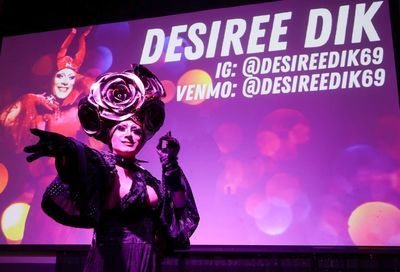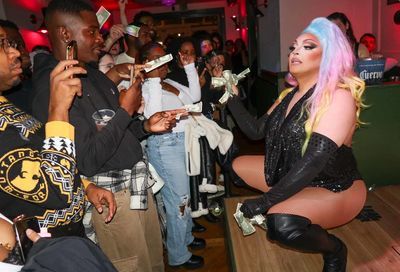‘Punch’ Review: Right Hook
Stepping into the crowded ring of gay coming-of-age indies, the dour boxing drama 'Punch' scores points for its soulful romance.

Queer filmmakers and audiences alike must hold a special place in their hearts for gay athlete coming-out movies, of which there’s been a steady stream in the age of streaming.
No sport shall be left behind in the robust sub-genre of modestly budgeted, slow-burn indie romances involving a handsome star athlete ever so gently crossing a threshold of sexual awareness and acceptance.
Maybe the distinct lack of such representation in the real sporting world adds fuel to the fantasy of watching fictional soccer phenoms (Mario), rugby champs (Handsome Devil), track stars (Boys), crew mates (Summer Storm), and Olympics hopefuls (The Swimmer) claim their truth and their man — while also honing their fit, virile frames to a fine competitive edge.
Punch (★★☆☆☆), the feature filmmaking debut of New Zealand-based author and longtime LGBTQ activist Welby Ings, shifts the sports arena to the boxing ring.
Its somber tale of rural Auckland teen Jim (Jordan Oosterhof) gently crossing his threshold of sexual awareness towards defiantly femme, gay classmate Whetu (Conan Hayes), offers little in the way of originality, but at least feels rooted in a specific mood, place, and style.

The story and character details still could be more specific. While Jim busts his ass training for his first professional bout, his tough taskmaster dad, Stan (Tim Roth, in grizzled grump mode), goes twelve rounds with the bottle, usually coming out the loser.
Jim repeatedly finds dad passed-out drunk, though the drinking mostly occurs offscreen, and without accompanying insight or examination into Stan’s life, past, or problems as a single parent. He’s a drunk, we’re told, and Roth’s performance doesn’t reveal much else of interest about him.
Stan does hold it together enough to arrange the professional fight that could catapult Jim into a potentially lucrative career. But, like Stan’s drinking, the film outlines Jim’s boxing only enough to set the scene. In montage after picturesque montage, Jim spars and trains — in one scene sprinting naked up and down the dunes — but the film depicts only a single boxing match, and makes no effort to characterize Jim’s fighting prowess or competitive spirit.
He delivers a starry-eyed speech about how a boxer steps into the ring and transforms, calling it “the most beautiful thing,” and then we never really see that happen. The boxing’s basic, a useful cultural milieu for exploring toxic macho attitudes and behaviors, a world attuned to violence.
Eventually, as Jim and Whetu grow closer as friends, the brutality of Jim’s world spills over into Whetu’s fabulous gay solitude as the town outcast. As is all too common in these coming-of-age, coming-out features, the most vicious physical violence and degradation is reserved for the proudly gender-nonconforming queer kid.

Yet the violence rings true of this moment in human history, and in their grayish, industrial seaside town, where apparently Whetu is ostracized also for being Maori. That’s according to the synopsis, though Whetu’s cultural identity is given scant onscreen context. He’s never shown interacting with family, or anyone other than either Jim or the townspeople who harass him. The only culture Whetu openly identifies with is the gay culture in far-off Sydney, the Oz he hopes he’ll escape to someday.
For now, on this beach in Auckland, he has his dog, Moimoi, and the cozy home he’s made of an abandoned beach shack. There, Whetu and Jim discover each other, bonding over shared dreams, frolicking in the sea in their skivvies. The film paces out their blossoming romance in spare, warmly-lit shots of the pair seated side-by-side on the shack’s front steps, or playing in the sand, as composer David Long’s Brokeback-ish score twangs plaintively.

Oosterhof and Hayes forge a rapport that keeps the Jim and Whetu connection at the forefront. And when that connection is tested, the movie lands its sharpest blows, with Whetu arguing that a true LGBTQ ally has to be ready and willing not just to dance for queer joy, but to stand up and fight back anywhere and everywhere that joy is threatened.
Punch is playing in select theaters, and is available through VOD and digital platforms including iTunes, Amazon Prime Video, and Google Play. Visit www.yellowaffair.com/punch.
Support Metro Weekly’s Journalism
These are challenging times for news organizations. And yet it’s crucial we stay active and provide vital resources and information to both our local readers and the world. So won’t you please take a moment and consider supporting Metro Weekly with a membership? For as little as $5 a month, you can help ensure Metro Weekly magazine and MetroWeekly.com remain free, viable resources as we provide the best, most diverse, culturally-resonant LGBTQ coverage in both the D.C. region and around the world. Memberships come with exclusive perks and discounts, your own personal digital delivery of each week’s magazine (and an archive), access to our Member's Lounge when it launches this fall, and exclusive members-only items like Metro Weekly Membership Mugs and Tote Bags! Check out all our membership levels here and please join us today!


























You must be logged in to post a comment.